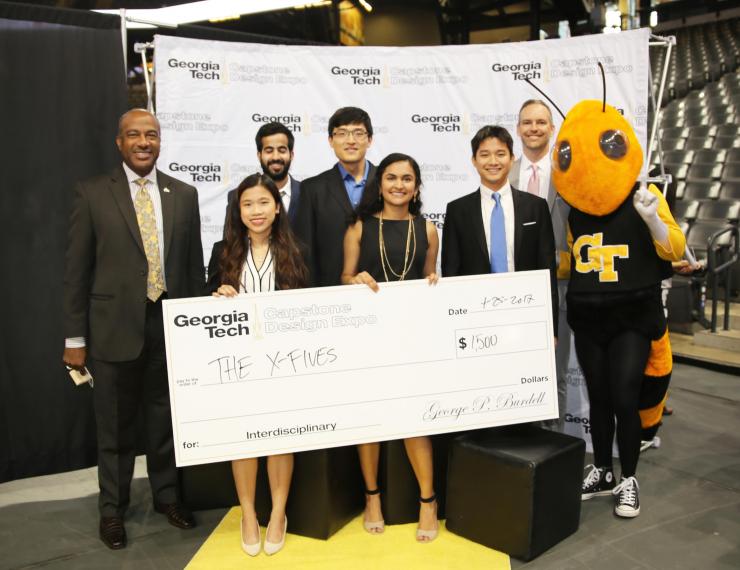CTSA Continues Support of BME Capstone Design Teams on Quest for Biomedical Solutions

The X-Fives Team
One of the aims of the Research Technologies program is to develop and implement training programs that will supply investigators with skills and knowledge to traverse the idea path. To meet this aim, the program supports the Capstone Design program created by the Wallace H. Coulter Department of Biomedical Engineering at Georgia Tech and Emory (BME). The program is a series of courses offered to undergraduate BME students at Georgia Tech that help provide an opportunity for biomedical engineering seniors to experience product development in the medical device industry. Students work in teams to design, build, and test prototypes with real-world applications. At the end of each semester students showcase their efforts at Georgia Tech’s Capstone Design Expo and compete in design competitions such as The InVenture Prize.
Research Technologies most recently supported 41 BME Capstone Design program teams (spring 2017). Out of the supported teams, two took home honors during the 2017 Capstone Design Expo. The X-Fives, an x-ray machine positioning robotic arm, won the best interdisciplinary project and PediaTRACH, an endotracheal tube detector, won best BME project.
The X-Fives created the MICRA (Micro-C Robotic Arm). It is ceiling mounted and will hold, move, and position an x-ray machine. The MICRA allows the surgeon to take x-rays without needing the assistance of a technician and then can be retracted back into the ceiling, thus reducing the amount of time and effort needed to take an x-ray during surgery. The X-Fives team is made up of Dhara Patel, Biomedical Engineering, Alpharetta, GA; Minh Tran, Mechanical Engineering, Vinh, Vietnam; Haili Du, Biomedical Engineering, Atlanta, GA; Quynh Tran, Mechanical Engineering, Ho Chi Minh, Vietnam; and Aman Bedi, Mechanical Engineering, New Delhi, India.
Pediatric patients who need endotracheal tubes to breathe can suffer from problems due to misplacement of the tube. Due to this, it is industry standard to take daily x-rays to visualize tube placement. Team PediaTRACH created a device to ensure tube tip placement without radiation. The PediaTRACH team is made up of Kara Hardin, Biomedical Engineering, Evans, GA; Nasya Paul, Biomedical Engineering, Ridgecrest, CA; Joanna Gochuico, Biomedical Engineering, Princeton Junction, NJ; and Dhanushka Vitharana, Biomedical Engineering, Canberra, Australia.
BME Capstone project topics are proposed by a wide variety of healthcare professionals such as physicians, nurses, emergency technicians, biomedical industry personnel, academic researchers, and patients. The X-Fives’ project was proposed directly by biomedical industry company, Micro-C Imaging, to support the Micro-C x-ray machine. The PediaTRACH project was proposed by Children’s Healthcare of Atlanta.
The Capstone Design course produces industry-ready professionals, complete with work skills, and technical, business, and clinical literacy. The students learn and apply the engineering design process: defining functional requirements, conceptualization, analysis, identifying risks and countermeasures, selection, and physical prototyping. Students then work to solve a challenge, develop innovative tools, or work on their own dream project leading to creation of a start-up company.
Georgia Tech’s Capstone Design Expo is the largest student design expo in the U.S. It is an opportunity for student teams to present their innovative ideas to solve real-world problems to industry, investors, and the general public.
“I want to thank the ACTSI for support of our Capstone program. BME has a spectacular showing each year,” said James Rains, Director of Capstone, Wallace H. Coulter Department of Biomedical Engineering, Georgia Tech and Emory University.
The Georgia Clinical & Translational Science Alliance is a statewide partnership between Emory University, Morehouse School of Medicine, Georgia Institute of Technology (Georgia Tech), and Univeristy of Georgia and is one of a national consortium striving to improve the way biomedical research is conducted across the country. The consortium, funded through the National Center for Advancing Translational Sciences one of the National Institutes of Health’s Clinical and Translational Science Awards, shares a common vision to translate laboratory discoveries into treatments for patients, engage communities in clinical research efforts, and train the next generation of clinical investigators.